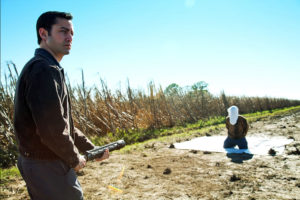This is what I have instead of a Top-Ten (or Not Top-Ten): A handful of oddities that I’d wanted to bring up sooner rather than now. Chances are that, except for number two on this list, none of them will be in play during awards season. (And I’m already getting fed up with awards season even though it’s barely started.) So before this year ends (and it turned out to be a better overall year for movies than I thought it would be at midpoint, though still not as great as fifty years ago), here’s some surplus babble about stuff you’ve already forgotten about.
Moonrise Kingdom – Full disclosure: I was, as is the hero of this movie, 12-going-on-13-years old in the summer of 1965. I was so hopeless at making and keeping friends that I was bullied by boys even geekier than me. This may partly explain why I was drawn to this Wes Anderson movie more intimately than any of his others. I didn’t have an off-shore island at the edges of northern New England to escape to, except for whatever zone of solitude I was able to create for myself in the middle of southern New England. And I didn’t know then that what I really needed to deliver me from my pre-adolescent miseries was a gangly, brooding girl my own age with a violent temper, a yen for Benjamin Britten and a protective instinct towards fellow outcasts. It wouldn’t be the first time I’ve felt nostalgic for a past I never had. It is however the first time I’ve been genuinely touched by a Wes Anderson movie with real people (as opposed to the animated Fabulous Mr. Fox, which I also liked a lot despite the perpetually grandstanding, self-aggrandizing hero-figure all too typical of the Anderson c.v.) The guess here is that Anderson’s experience with making Mr. Fox helped tighten his narrative flow and keep his own gangly-ness under control. There’s a generosity-of-spirit towards his characters here that one associates more with Renoir or even Preston Sturges than with Wes Anderson; even the mean kids don’t seem so bad once you know them a little better. It doesn’t exactly make me want to go back to Rushmore or The Life Aquatic with Steve Zissou for a visit. But I might give The Royal Tenenbaums or Darjeeling Limited another try after the New Year.
Beasts of the Southern Wild – This one still gives me trouble and I’ll try to keep the reason why as simple as I can: As much as I wanted – and waited – to be transported by this movie, I wasn’t. I keep wondering if this was my fault since Beasts has landed on the Top-Ten lists of critics I respect (and a few more of those I don’t). Yes I am as captivated as the rest of civilization by Quvenzhane Wallis and I believe Dwight Henry’s performance as her tormented, but ferociously loving father was itself a masterwork of empathy – and not bad at all for a man whose day job is baking. I also am all in with anybody’s efforts to coax magical realism from beneath the topsoil of American folklore using recent trauma (e.g. Katrina) and potential catastrophe (e,g. global warming) as psychic sources. But all the while I watching it, I felt as though I were willing the movie to become what it was trying to be instead of being drawn into its dreamy phantasmagoria. And just so you know, I hold no brief with those who find the movie in any way condescending towards its characters, especially when they’re as doughty as Wallis’ Hushpuppy or as complicated as Henry’s Wink. I suppose that even in a dreamland such as this, you can’t afford to find yourself drifting along for as many stretches as you do here. By the time the Aurochs finally got to the Bathtub, or vice-versa (go ask somebody else), I felt more detached from the dream than I should have been. The father and daughter were the only reasons I still cared. And that might have been enough in other movies. But not for one as ambitious as this.
Looper – Some of my friends, even those who claim to like science-fiction, contend there wasn’t much more to Rian Johnson’s thriller beyond a premise fitting more comfortably in an hour-long episode of The Outer Limits. I’d have watched such an episode several times over and I still wouldn’t have found the cunning verisimilitude Johnson sustains throughout this spirited chase through time. Ideas are what set off a science-fiction story. Plot is how you roll with it. But atmosphere, especially in an SF movie, is what keeps you staring at it. The way telepaths stuck at the bottom of the world off-handedly show off their kinetic skills, either from boredom or for drinks, makes you recognize a future you’re not sure will ever exist – or, on the other hand, doesn’t exist in some form right now. When an SF movie is really bad, there’s nothing worse. (Ask my old pals, Servo and Crow.) But when it’s as supple and smart as this, few things are better.
The Avengers –I have fonder memories of this comic-book movie than those of The Amazing Spider-Man (which had its own arcane charms) and The Dark Knight Rises (which had Marion Cotillard). Mostly, I just thought, pound for metallic pound, this had more antic energy being pumped into our collective foreheads. I also think it’s unfortunate that Mark Ruffalo’s shrewd, incisive performance as Bruce Banner, The Hulk’s alter-ego (or, to be more clinically accurate, super-ego), is destined to be overlooked for awards because of all the popcorn butter sticking to its surroundings. His quietly magnetic evocation of a lost intellectual struggling to contain his bone-deep fury stole the movie from all the buff physiques surrounding him. Somehow with all the other super-heroes and double-dealing villains looking either too anachronistic or too sleek, Ruffalo’s tweedy-but-wary reticence seems more above and beyond its immediate environment. He’s almost too good for the movie he’s in – and yet the movie would be even more disposable without him.
Robot and Frank – If Looper’s science-fictional premise seemed to skeptics custom-made for hour-long television, then Robot and Frank’s could fit into an installment of a half-hour series comprising unsold sitcom pilots. (I mean this as a compliment, because I grew up as a fan of those old summer anthologies — or of what Robert Klein once swept beneath the rubric, “Failure Theater.”) It’s a small, decorous movie that maybe needed to sublet some of Looper’s or, for that matter, The Avengers’ insurgent energy so it could leave deeper resonances. Frank Langella plugs up the more fallow aspects of this story with a beautifully enacted portrayal of a retired second-story man with creeping dementia who bonds with a talking appliance. You come away remembering him – and carrying at least one cutting irony: That an old man with an active grudge against a billionaire seeking to replace the printed page with all-digital texts uses artificial intelligence to carry out his vengeance. Those of us who roughly share a certain age might leave this movie wondering how much time we have left to pull off our own capers against a future we didn’t ask for – which constitutes as much heft as this lighter-than-air movie can take.


